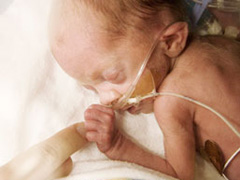Wrapping Premature Babies in Plastic Saving Lives? Study will determine…
Sunnybrook investigators are leading a study to determine whether a clear plastic bag that costs just three cents can reduce the likelihood that a premature baby becomes sick and possibly dies.
The Heat Loss Prevention Trial is an international randomized control study involving over 40 neonatal intensive care units across the world. Babies are eligible for the trial if they are born at less than 28 weeks gestation, with 40 weeks being considered full-term. Babies in the wrapped group are placed in an open plastic bag (polyethylene occlusive wrap) that is wrapped around their bodies, with the baby’s head remaining outside the wrap. They then receive care according to normal neonatal intensive care practice; as the wrap is transparent, the caregivers can see the baby’s body through the wrap. Time in the plastic bag ranges from 30 to 90 minutes, the time required to stabilize the baby after birth and just before transfer to the isolette or incubator.
“Because they are born before they have completely grown and developed, premature babies have a difficult time keeping warm soon after birth,” explains Maureen Reilly, respiratory therapist and co-principal investigator of the trial. “At birth, they are covered with wet amniotic fluid that begins to evaporate and cool the baby. Several small studies have shown that wrapping premature babies in a layer of plastic, sort of like Saran Wrap, immediately after birth helps to keep them warm. While we know that wrapping babies in plastic just after birth keeps them warm, the purpose of this study is to determine whether it reduces their chances of becoming sick and possibly dying.”
The EPICure study in the United Kingdom showed that 36 per cent of infants born between 24 and 25 weeks gestation had an admission temperature less than 35 degrees Celsius. This body temperature is considered to be too low and is termed hypothermia. Hypothermia is associated with increased risk of morbidity and mortality.
The study has received $640,000 in funding from the Canadian Institutes of Health Research, with the first baby placed in a plastic bag in November 2004. All centres participating in the study are members of the Vermont-Oxford Neonatal Network, an international voluntary collaborative organization of neonatal intensive care units from around the world. The study plans to recruit 1685 babies. “Families have been so receptive to participating in the study,” says Maureen.
Information about the babies’ development is gathered when during a visit to the Neonatal Follow Up Clinic at 18 months of age. Recruitment is expected to be complete in 2009.
Sunnybrook is transforming health care through the dedication of its more than 10,000 staff and volunteers. An internationally recognized leader in research and education and an affiliation with the University of Toronto distinguishes Sunnybrook as one of Canada’s premier academic health sciences centres. Sunnybrook specializes in caring for critically-ill newborns, adults and the elderly, treating and preventing cancer, neurological and psychiatric conditions, cardiovascular disease, orthopaedic and arthritic conditions and traumatic injuries.
PDF / View full media release »







